I have no idea what it’s like to grow up in a small town. And there are two reasons for this.
For starters, I didn’t grow up in a single town. I grew up in two, and neither of them were particularly small. But neither of them were ‘big’ either. I’d say there were about medium.
Sault Ste. Marie was a nice enough little border town, twinned with its American neighbour. I remember once getting a kick out of doing a bit of ‘international travelling’ over my lunch break, because my mother decided we’d have lunch across the border. It seemed almost surreal. And Sault Ste. Marie was also a major port of call across the Great Lakes, connecting Superior to Huron. So it had enough of an industry, specifically the giant steelworks that you’d get a great view of while travelling over the international bridge, which gave the town a sizable population. And it was big enough that you couldn’t possibly know everyone. But it was also too small to have anything interesting going on. I’m remember we had a museum, but I also remember that I lived in houses that were bigger than that thing. I also remember I lived in a lot of houses.
Then, when I was around 11, craziness happened and I moved to Sudbury. A much larger town, with much more going on, including a very large science centre that I used to spend entire days at. But it also had much less sophistication. A real hick town. I blame the mines.
And now, I live in the big city! Oshawa! Part of the GTA (apparently)! And I actually like it here. My only wish was that it was easier to get around. If only I didn’t melt my car last year.
But I’ve passed through small towns, and I’ve met people who’ve lived in them, so I know they exist.
You know what I mean by ‘small town’ right? One main/high street where every business is located, surrounded by side streets filled with houses, one or two schools, and a church because every town needs one apparently. And with such a small population, it’s like the Cheers bar grew and mutated to 100 times its original size.
You know the Cheers bar right? You’ve seen Cheers… Where everybody knows your naaaaame… Right?
Anyway, it’s a place where everyone knows everyone. It’s peaceful, and quaint, and nothing bad ever happens. Or at least, that’s the stereotype, init?
In our culture, small towns are romanticized. They’re quaint little places, with tightly knit communities, and where everyone can trust anyone, and the biggest possible crisis would be the time when Mrs. Fielding found out she might not have enough yeast for the bake sale.
But is that accurate? Probably. But in even in the land of sugar and friendship, they got a few bad apples, so it’s likely that even in the coziest of small towns, you have a few pieces of rotten fruit. Perhaps not apples, but some type of plant-matter. But even then, exactly how bad can it get?
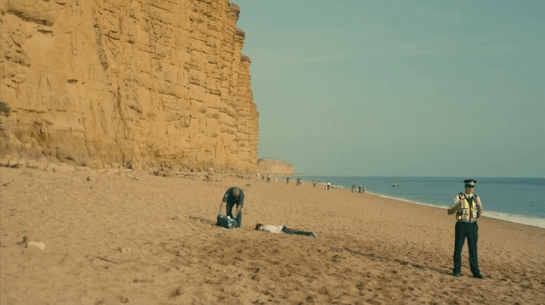
The murder of an eleven-year-old boy… Well, that’s pretty bad.
Ladies and Gentlemen, welcome to Broadchurch.
Broadchurch opens with the unexpected murder of one Daniel Latimer in a small South England coastal town appropriately called: Broadchurch.
Assigned to the case is Detective Inspector Alec Hardy, played by the Tenth Doctor himself, David Tennant.
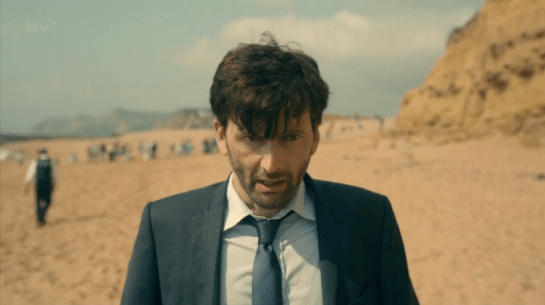
He’s a man who’s haunted by his past failures. Specifically the last child-murder he worked at Sandbrook, which was a case he bungled. Because of that he spends the entirety of the series desperately trying to solve this case, in order to prove he’s not a complete fuck-up. Even at the expense of his own health.
Hardy is also new to the town, which means much of the town’s background has to be explained to him by his partner.

Meet Detective Sergeant Ellie Miller, played by Olivia Colman, whom you might remember as that coma patient from that one episode of Doctor Who.
She’s the local cop who has to explain much of the town’s background, since she knows most of the town’s residents. She’s also emotionally invested in the case, since Danny’s family just happens to be close personal friends of hers.

Ladies and Gentlemen, the Latimers:
 There’s Beth, the grieving mother, who (justifiably) doesn’t handle the situation very well. Primarily because she doesn’t know how. By her own admission, she spends much of the series feeling lost and empty, unsure of what to do as her entire world begins to fall apart. And I’m not just referring to her son’s death, because that’s just how things start.
There’s Beth, the grieving mother, who (justifiably) doesn’t handle the situation very well. Primarily because she doesn’t know how. By her own admission, she spends much of the series feeling lost and empty, unsure of what to do as her entire world begins to fall apart. And I’m not just referring to her son’s death, because that’s just how things start.
 Then there’s Mark, who I think can be best described as ‘the stoic one.’ His grieving process mainly involves crying quietly to himself, or staring silently at anything that reminds him of Danny.
Then there’s Mark, who I think can be best described as ‘the stoic one.’ His grieving process mainly involves crying quietly to himself, or staring silently at anything that reminds him of Danny.
 Finally there’s Chloe, the rebellious teenager. I’m not sure exactly what to make of her. Her grieving process appears to consist of being hypersensitive and argumentative, but she also handles things relatively analytically; her first moves being to leave one of her brother’s toys by the beach where he died, and to set up a Google News alert for ‘Broadchurch Death’.
Finally there’s Chloe, the rebellious teenager. I’m not sure exactly what to make of her. Her grieving process appears to consist of being hypersensitive and argumentative, but she also handles things relatively analytically; her first moves being to leave one of her brother’s toys by the beach where he died, and to set up a Google News alert for ‘Broadchurch Death’.
So this is the grieving family, and as the story goes on, their entire lives begin to fall apart as personal secrets come to light. And how they handle them adds more and more drama to the series.
But it’s not just them. The entire town finds itself nearly torn-apart by the murder. Because such an act is so unthinkable to them, everyone becomes a suspect.

And I mean everyone. Which becomes a particular challenge for Ellie, who now has to suspect her friends and neighbours as murderers. That’s not easy to do. And it becomes quite apparent (mainly because David Tennant says so) that she’s too close to the town to remain objective. And the longer the show goes on, the more apparent this becomes to both the audience and to her.
“If it’s someone here, why can’t I see it?” – Miller
But it’s not just her. As everyone begins to suspect everyone, the town turns on itself. And it all comes to a head when the elderly newsagent and Sea Brigade master, Jack Marshall, ends up being accused of being a pedophile.

And all because he was once imprisoned for statutory rape.
Okay, that seems like a very good reason… at first. But it eventually becomes apparent that he’s not, once the full context is revealed to Danny’s father in a quite heartrending scene where Mark finds himself empathizing quite fully with Jack.
In fact, this is one of my favourite points about the series. There are several times where altered perspective is displayed by having similar situations play out twice, in very different contexts, revealing the true context of a given situation.
I don’t think I’m explaining this well. I’ll give you an example. There’s one scene where Beth, still missing her son, asks for a hug from his best friend, Tom; stating how much she misses his hugs.

Then, in the very next episode, we learn that Jack Marshall frequently gives hugs to the boys in his care.
(By the way, in case you’re wondering, Sea Brigade is similar to Scouts.)
Of course, this is actually the main reason people think he’s a pedophile. And as a posse comes around with torches and pitchforks, we have the scene with him and Mark, where he explains the real reason he frequently gives hugs to young boys: He misses his son, who died several years ago at the age of six.
“No parent should outlive their child.” – Jack
Well, it makes sense now! Doesn’t it!?
And this actually happens a few times in the show. My favourite being at the very end of the series, which you’ll just have to see to understand, because I can’t explain without revealing who the murderer is.
Of course, the great thing about Broadchurch is that I could probably do that without ruining the show. Because it’s not really a murder-mystery, it’s a character drama framed around a murder-mystery.
The most interesting parts of the series only involve the investigation tangentially, such as the issues with Jack Marshall. While many plot threads are spurred on by the murder investigation, either through random suspicions, or secrets being uncovered by the police, they quickly take on a life of their own, despite the fact that they have nothing to do with Danny’s murder.
But let’s talk about the murder case.
Danny dies of strangulation. A brutal act. And throughout the course of the series, it’s clear that anyone could’ve done it.
And indeed, anyone could’ve, that’s the funny thing. While there are clues sprinkled throughout the series as to who the real killer is. The series is set up so anyone could’ve done it. Anyone could’ve had motive, including the family. Chloe could’ve killed her brother to keep her boyfriend a secret. Mark could’ve killed his son to keep his affair a secret, and Beth could’ve… Actually she’s probably one of the few exceptions. I’d also include Ellie in that as well, I don’t see a scenario in which either woman could’ve killed Danny. But I can find a scenario for Alec Hardy.
He could’ve killed Danny to create a case that he could use to redeem himself after Sandbrook, which he’d plan to frame someone for after a few months. Of course that would’ve been tossed in the bucket once we saw Hardy’s reaction to the dead little boy on the beach. One of fear and dread. Though it could’ve easily been one of regret.
By the way, spoiler warning: None of those people actually did it.
The murderer is actually someone who didn’t even make my shortlist. This person wasn’t even on my radar as a possible suspect. So I was really thrown for a loop when the killer was revealed.
And I’m honestly not sure whether it’s because the killer was incredibly well-hidden, or I’m just thick.
Actually, it might’ve been because I wasn’t actively looking for a suspect, come to think of it. I was too busy being absorbed in the atmosphere.
I think this might be my favourite part of Broadchurch: the ambience and pacing. It never rushes through plot points, and has a tendency to linger on certain scenes to allow the full emotional impact to kick in. Some scenes are actually shown in slow motion, with no dialogue and only ambient music playing. All it does is reflect the characters’ perception, as they witness Danny’s mother breaking down on the beach; or the Latimers going to church shortly after the media frenzy begins; or in the final episode, as Hardy walks down the street, when he knows the killer will finally be revealed.
I love this effect. And it’s made especially powerful by the music, which comes courtesy of Icelandic musician, Ólafur Arnalds. His soundtrack is beautifully atmospheric, and does a great job at setting the dark and mournful tone of the entire series. I can’t speak highly enough of it.
Of course, while watching the show, you probably won’t notice the music. But that’s one of the reasons it’s so good.
So do I recommend Broadchurch? Hell yes! It is one of the best dramas I’ve ever seen come out… anywhere! Not just Britain, but the entire world! Which should surprise no one. It was enormously popular over there, and won several awards. Which is part of the reason it caught my attention. Well, that and David Tennant.
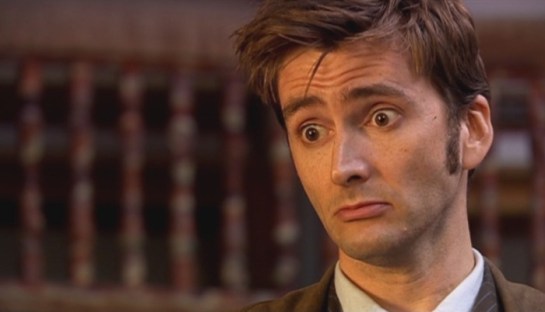
What can I say? I’m a big Doctor Who fan.
Anyway, with all that acclaim behind it, is it any wonder the Americans tried to replicate it?

This is Gracepoint, Fox’s answer to Broadchurch.
I never understood the logic behind this. Hey, here’s a great British show, we should bring it over to the US! But we’ll have to remake it, because it needs to be translated from British!
Regardless, it has the same writer, and much of the same plotline as Broadchurch. It even has the same leading man, only this time in a bad American accent.

This is Detective Emmett Carver, who is nothing more than an American version of Alec Hardy.
In fact the vast majority of the series’ plot and characters are copied verbatim from the original series. However, there are a few changes.
The one I noticed the most was the circumstances of Danny’s death. In Broadchurch, he was strangled by someone in a violent rage. And sure, they didn’t contentiously want to kill the kid, but nonetheless it was murder, pure and simple.
In Gracepoint, Danny hit his head on a rock. It was completely accidental. Manslaughter at worst. It changes the nature of the crime completely, and I say for the worse. But that didn’t become obvious until the final episode.
Up until then, there were several changes in the show’s plot and characters.
For starters, Gracepoint had two extra episodes to fill, so they expanded a minor plot thread from Broadchurch about drugs, introduced a random backpacker for the cops to dump suspicion on for a few episodes, and finally devote an entire episode to Danny’s best friend going missing, during which we also meet Tennant’s daughter who just stands around the cop shop looking bored.

Yeah, she added so much!
I mean, don’t get me wrong, the additions, even the daughter, weren’t terrible, but they do feel like unnecessary padding… which they were.
There were also a few character changes. To start, there’s Mark Solano, Gracepoint’s answer to Mark Latimer.

Aside from the name change, the most obvious difference is that he’s Hispanic, which isn’t actually a difference because it’s irrelevant to the character. Other changes include his obvious problems with anger and jealousy, that Mark Latimer never displayed. And I think that might be racist.
It’s also ridiculously hypocritical since it’s revealed early on that he had an affair with another woman.
I never felt the need to punch Mark Latimer. Mark Solano, on the other hand…
Next is the local vicar, Paul Coates. In Broadchurch, he was played by the excellent Arthur Darvill, well-known from his role as Rory Williams in Doctor Who.

Here, Coates is played as awkward and slightly insecure about his standing in the community. In fact, he has to be persuaded into going to the media in an attempt to reassure the community that their local church is there for whatever they may need.
I think that makes sense if you’re religious.
In contrast, the Coates of Gracepoint is slimy and opportunistic. Taking every opportunity to promote the church in the wake of Danny’s death. No wonder Mark hates him.
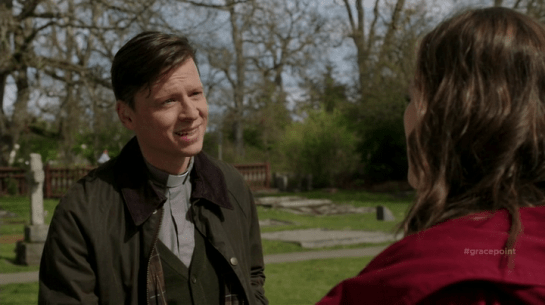
This might have something to do with the casting. Darvill was fresh from Doctor Who, where he played a character who was awkward and nerdy. And apparently the role was written with him in mind. And I haven’t seen Kevin Rankin (who plays Gracepoint’s Coates) in much else… one episode of The Newsroom… and he played a slimy character in that show too, so it looks like he’s been typecast.
Of course, with the exception of Tennant, the entire cast is completely different, which also resulted in a few changes in characterization by consequence. Sometimes for the better.
For instance, Susan Wright. In Broadchurch she was… I think the best word to describe her would be: evil. But not because of anything she did, or what she said (well, except for that one scene) but because of her look. She just looked like someone who would kill you in your sleep and not give a shit.

In contrast, the Susan of Gracepoint makes me think of a kindly old grandmother, and any sign of evil we get from her is purely in her actions and dialogue.

I guess that’s why they showed her killing a chicken with her bare hands. Such an action was unnecessary in Broadchurch. But I like the Susan of Gracepoint much more, primarily for that reason. There’s a bit of contrast between what you’d expect, and what actually happens. Plus, you actually feel sorry for her. Not so much in Broadchurch.
Then there’s Jack Reinhold, whom Nick Nolte makes a lot more angry than the kindly old Jack Marshall of Broadchurch.

There’s a few more changes. The newspaper editor is younger and more free-spirited. The chief of police is a man instead of a woman. And the Solano’s family liaison officer is played by Patrick Gilmore, a.k.a. Dale Volker from Stargate Universe.
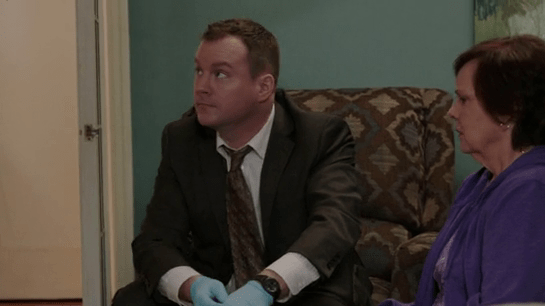
I still miss that show.
Also, the music’s different, and more reminiscent of generic American television.
But beyond that myriad of changes, the show’s pretty much identical. And taken on its own, I loved Gracepoint. But overall, I cannot compare it favourably to Broadchurch.
Broadchurch was tight, and well-rounded. With the right atmosphere, and ideal characterization.
Gracepoint feels a bit more padded and loose. And many of the added plot points just annoyed me. Specifically those involving Mark Solano and the vicar.

You prick! How dare you be a priest!
But of course, we also have the ending, which is also different. And after all that, with all of Broadchurch’s success, a second series was almost a given. Even from the close of the final episode. And miracle of miracles, it’ll be here this coming Monday, the 5th of January, on British Television!

I know I’m excited! But not for any mysteries that might pop up. I’m excited to see the characters and how they carry on after the events of the first series.
In fact, my wishlist for the coming series does not involve any potential main plots, but merely the side plots and character relationships. I hope to see the vicar get together with the hotelier. I hope to see Chloe and Tom learn to become friends. I hope to see that little shit of a journalist kid come into his own. I hope to see the ‘former detectives club’ redeem themselves after series one. And I hope to see Beth finally understand what happened in the final episode.
But what I hope might not come to be. And regardless, if there’s one thing I’m quite thankful for, it’s the fact that a second series was never necessary. The first series was perfectly self-contained, which is a rare sight these days. Most shows decide to end with some cliffhanger to kick off the following season. But if the next season never comes, you just end the series by pissing off the audience.
By the way, that’s what Gracepoint did. They changed the ending slightly to give us a major cliffhanger to end on.

Holy shit! What’s going to happen next!? Nothing. Because Gracepoint wasn’t as successful as the British original, likely because of the dumbass Americans who didn’t ‘get it.’ So it’s not getting a second season.
So with all that being said, if I had to pick one series to recommend over the other, it would definitely be Broadchurch, partially because we get closure out of it, as well as a second series. But Gracepoint’s definitely worth a look as well, if only to see the changes, and to see how much American execs can arse a program up.
So if you get a chance, give Broadchurch a look. Binge watch the first series this week, and join me for the second series in the new year. You’ll be glad you did.
